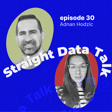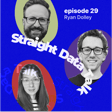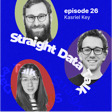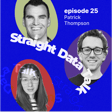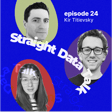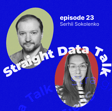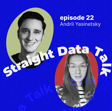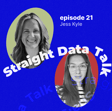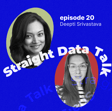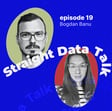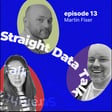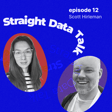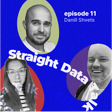Become a Creator today!Start creating today - Share your story with the world!
Start for free
00:00:00
00:00:01

Amy Raygada: Data Consultancy in 2024: Navigating AI Hype, Org Silos, and Drive an Impact
Amy Raygada, data consultant and founder of Cosmodata, recently joined the Thoughtworks team. Together with Yuliia, she unpacks what it’s like to work as a data consultant in today’s world, where AI challenges every organization. Amy shared her journey from individual contributor to consultant, offering insights on navigating organizational silos, the similarities between being an individual contributor and a consultant, and how to advise big organizations while making a meaningful impact.
Amy Raygada linkedin - https://www.linkedin.com/in/amy-raygada/
Transcript
Introduction of Emi Rigara
00:00:00
Speaker
Hi, everyone. ah It's Yuliam, and we're Backstreet Data Talk. And today, it's my pleasure to host Emi Rigara, who is a fabulous data professional friend of mine. And Emi, please jump in and introduce yourself.
00:00:20
Speaker
Thank you so much for the nice words, Julia. Well, uh, yeah, my name is Amy regatta. I've been working in it for the past 18 years. Sounds a lot. The first, um, years were in software engineering, but since 2013, I've been working with data. So I've been doing everything seen from data quality, data engineering, data product management strategies, governance, and now consultant.
00:00:45
Speaker
That sounds a lot.
Consultant vs. Individual Contributor
00:00:48
Speaker
Listen, I mean, ah You know, we were trying to jam what we're going to be talking about. This is all freestyle, as I call it. But what is interesting that we met while you were a um ah personal contributor, right? Yeah, yeah, yeah. A large organization, like a big group of companies. And right now you are with ThoughtWorks being a consultant, I would say high tier consultant.
00:01:19
Speaker
Yeah, so my question, you know, because lots of folks in data space are pivoting to have their own consultancy now. There is also a new way with people who are doing fractional data director, CDO, like being part-time CDO. I don't know if it's even working, but I'm curious. I'm curious to learn what is different with you personally. ah um right now being a consultant compared to being a personal contributor in a huge organization. Yeah. It's quite different. Actually, I started to to explore that topic already a couple of years ago because I was giving free mentorship in the mentoring club. um And I will get, for example, startups, um people who wanted to know how to implement ah data governance or data product design or these kind of things. And I kind of like the flow that you can advise people, right, to make a change in their organizations.
00:02:13
Speaker
Then I opened my company, Cosmodata. I also do the same for workshops and these kind of things. And I thought, I really like this. So when Todd works at some point, contacted me this year, I was like, I had never really tried that in this huge organization with a big name you know where people that I admire ah for different reasons in different areas of IT. I said, I'm going to give it a try. However, you know One of the things that I was frustrated working as an individual contributor was basically the fact that you have to play a constant game of thrones all the time. you know like Talking with people here, talking care with people there, sometimes they are they are agreeing with you, but someone else says something and everything, all the work you'll be here for months are basically on the ground. You have to start all over again, but nothing gets really done. And you have seen, you know there are companies I have seen in the past as well, like
00:03:09
Speaker
When a consultant gets there, they kind of listen because they're paying a lot of money and you see that, oh, whatever I've been telling for years, now someone said it and they are like, we have to do that. And I thought, okay, maybe I can now make an
Challenges and Teamwork in Consulting
00:03:24
Speaker
impact being a consultant and tell people you know how to do things better and they will be able to do something good for their organization, but actually not quite there, I will say.
00:03:37
Speaker
that's quite Okay, this is really interesting.
00:03:43
Speaker
So for me, the biggest, how do you say? It's true, I guess, with a consultancy. and i'm is it You don't actually work on things. you know ah you just How do you have the influence to suggest people to do something if you kind of cannot roll up your sleeves and you know implement the solution? like yo
00:04:15
Speaker
like but It be my biases. Have you, you provide actionable value while consulting people? This is a question, I guess. It's an industry that is really money-driven, right? The projects, to bring projects. And I know other, you know, bigger companies as well, you know, like Accenture or Lloyd or Tech Mahindra, you know, all of this. All of them have the same mindset of let's go and get projects.
00:04:44
Speaker
And I have worked with some of them and I have had bad experiences because they go really on the surface, right? I see you mentioned just like a little bit. They kind of know how to sell. They know how to say cool things and then the people just buy it.
00:04:59
Speaker
However, you know there there are opportunities where you can also bring developers, where you can bring people to implement those ideas. and I think those are like the most interesting you know kind of ah projects where you can also have people and guide these people because you know I'm in the principle level so I can guide them and tell them, okay, we're going to do this, we're going to change that, we're going to move forward, but also that the company is also open and willing Because sometimes, you know, we get higher, but we cannot do whatever we would like to do because there are political games there as well. Maybe some constraints with time, with technology. You know, there is many factors that might not allow you as a consultant to do what you would like to do.
00:05:39
Speaker
um In my case, personally, because it's each consultant put their own style in their work, I really tried to get to know the customer.
Understanding Client Needs
00:05:48
Speaker
I really have a lot of interviews. ah For my current project, I spent maybe three weeks, eight to five speaking with different people just to understand the user needs because I believe a lot in this user center approach approach to be able to deliver some value right and and and actually measure it.
00:06:07
Speaker
um But there's others that are more like, okay, I'm gonna create maybe just ah architecture design and I'm gonna provide this blueprint and let's go with that. um I'm not a fan of those blueprints because I think that you need to, for example, create a strategy or something like that based on the needs of the customer. So ah when you are asked, usually if I get asked in my personal company,
00:06:37
Speaker
to do a blueprint or something like that. I am skeptical because I think there's more you know than just a template to provide.
00:06:47
Speaker
That's really interesting. So can I ask you how do you, ah how do you, so basically what are you saying at ThoughtWorks, you have ability to to choose a client, is it? No, no, usually a staffing, well, yes and no. Staffing will propose you different projects. You will speak with the ah client principal about what is the project, how is it going, what they are looking for. And if you feel that might be something interesting for you, you take the project.
00:07:15
Speaker
And you you you are allowed to say no. I mean, of course it's not a baseball, right? But ah you are allowed to say, sorry, but this industry, or maybe this sounds not something that I can really bring value. but first In my personal ah company, yes, of course. No, no, that's for sure. that I can understand. But this was yeah like, so how do you scope ah this project that you're about to work, like which questions do you ask to decide if they are right for you, like you if you can i mean and generate some wealth for them as well? yeah Usually you have ah you get from the client principal or the account manager some information that they add they probably need a workshop, you know, with a client before, and you get to so see a little bit in pieces. And then I will ah start asking, for example, okay, for example, let's say they want an AIS strategy.
00:08:12
Speaker
What have they done before? Do they even have an AI a strategy or data strategy? Do you know how is the infrastructure? Do we need to do a first assessment? you know or is Is this first an assessment or maybe it's just an implementation part of things?
00:08:26
Speaker
um How big is the team? What is the commitment um of the team as well? Because if they don't have enough availability, you cannot drive things forward. um These are the kind of questions you see. And also um for me, it's really important the the team in general that is going to be working with me, if it's internal, and of course have a connection with the stakeholders and and the management to be able to shape something that brings value at the end.
00:08:55
Speaker
have
AI Trends Impact on Consulting
00:08:56
Speaker
a tricky question for you. ah no great well rice out it Like a girl question. What is a red flag for you and a quand? What is no goal for you? Let's talk examples of the AI trend, right? Everybody wants that. When they tell me, I already did a hackathon and I have the use cases and I want an AI strategy. And I'm like,
00:09:24
Speaker
Okay. but Um, do you have a data team? No, just sums up or engineers or something like that. This is, I believe this is from your personal. I cost my data right. From your personal.
00:09:39
Speaker
um Let's say, consultancy, but what about ThoughtWorks? That is all that's also happens there. I don't know. I'm a big, big, big, big, big organization and something that you won't believe is this kind of ah European company too. Actually, that my last two projects were like this.
00:10:01
Speaker
We had a hackathon, we chose this ah this use case, and basically what we want is to have an AI readiness assessment. And then when they hear what is not going good, they kind of shut down and they say, okay, we just want an architecture design to be able to implement the AI solution. Yeah.
00:10:23
Speaker
But listen, isn't the AI bay generates for you consultants this much of a business today? like Isn't it you know the hype that actually promotes you guys? Because companies, we all hear the stories when SEO and other high level management will yell, can we AI it? We need the AI, it's whatever. I assume it generates lots of business for you, isn't it?
Vendor Collaboration and Tool Recommendations
00:10:52
Speaker
Yeah. but It's a tricky question because is it depends on how much personally you want to bring value or if you really want to get something, I mean, learn something yourself, right? From from another industry, from another company, from another completely ah infrastructure set up or whatever. Or if you just want just to have another project, get your paycheck and continue with your life. I think this is the the the difference, you know? Either you just want to have your monthly paycheck and you just do whatever you need to do.
00:11:24
Speaker
Or you really want to do something that that ah impacts the organization you're working with. And that's why I told you that I have my own style. I do my workshops and how I talk to the people, how I work with them is more this deep understanding because I don't want to provide them just ah shallow stuff. um We were working with one of those big consultancies in my previous company.
00:11:47
Speaker
And um the architect guy is really brilliant. ah And the the other, I mean, the system architect and the data architect, they are really brilliant, but they just provide really shallow ah things. And when I came to this organization, they were working with them for quite some time.
00:12:05
Speaker
and i And I had so many questions about why this, why that, why you didn't take into consideration, for example, even simple things like SSO or security management, ah cost allocations, or these are the data platform. And they cannot even answer because ah for them, they leave these Not just they lead these things without complete because that means that they are kind of vendor lock. So at some point they know they might need this service, you know, because they didn't put it in consideration at the beginning. So they will be, oh, but we don't know how to do this. Yeah. Maybe you should hire, you know, again, someone to do that.
00:12:42
Speaker
and I'm not talking about from Tom Works, but another you know big ah consultancy that I had the opportunity to work with. And this is other evil practice. ye Yeah. These are the things that you see right as an individual contributor. And then when I came there, you know they they had a really small team. So they took a advantage, of course, of the company because they needed to do this as staff augmentation. They needed to get rolling with the data platform and they wanted to grow the data team but it needed time to find the right people you know how it is to hire data people so they got them as an extra and also they didn't have an architect so of course they bought like the whole services but then you you saw there a lot of big holes they just put shiny stuff and
00:13:28
Speaker
but everything is not real. It's just like a charade. It's like a decoration, decoration of a data platform. Beautiful slides. Well, you know, there is some infrastructure involved, so it's not just slides, let's be honest. But it's also ah hundreds of hours of data engineering and engineering work, so it's not just slides. It's also...
00:13:57
Speaker
and that what ist Yeah, it's a skeleton, let's say, because there is still you know a lot of things to field um on the sites. Or even I have seen with other companies as well that they propose this data platform. um They construct it, but then you understand that they are using you know extra stuff because, of course, they work sometimes with vendors or stuff like that. right So just like, OK, maybe we sign up with Azure, but they are also using a Snowflake. and it made sense to have both things. When you see the architecture, when you understand, I mean, because I was working there, I'm like, why is this in this way? And they propose tools and tools and tools and tools, because of course, you know. Oh, this is really interesting too, because I'm, you know, the tools wise. Yeah, I can understand that they got
Project Transition and Client Dynamics
00:14:50
Speaker
commission, but this is not what actually drives
00:14:54
Speaker
um partnership you know with vendors for consultancy. This is not the biggest, how do you say, revenue no for consultancy. But this is an interesting take on a but about the ah solutions. As a vendor, I started to see more and more vendors in in data space attacking other vendors.
00:15:21
Speaker
yeah Did you see that? And I was impressed. And this is an interesting angle. Like, um I see different solutions that tag and would say observability solutions. ah Like, they don't generate any value, you whatever, we which is, I mean, to some extent, I agree with them. and Just a reminder that Mac had helped reduce a Google BigQuery cost at least by 50%. But no, no, no, no.
00:15:51
Speaker
and me The point is, I understood one thing, even working only with GCP users, if the solution gets you, gets the things done, it's just good enough. And other vendor can claim and in different use case, the other vendor can work better. And I'm trying to say that for every client, their stack could be very different to achieve their DMS goals.
00:16:21
Speaker
And it's so, what do you say? It actually makes sense for people to use what they are comfortable with, what makes the shit done. That's it. I don't understand why some lenders like attacking and didn't see the they I see that a lot of the orchestration industry.
00:16:44
Speaker
hey Even the scheduled query works for people. It very much depends. So this is something. So how do you guys work with vendors? This is also very interesting. like Do you promote vendors? Do you have hybrid vendors? How is that structured for you? It works.
00:17:04
Speaker
Even in AI space, you know, you can suggest one or another model, which actually makes difference that if you are talking about large organization. They can ask you for advice. Is a child DPT a tropical Gemini or whatever? You know, how do you how do you handle that?
00:17:24
Speaker
Um, to the point, yes, I have seen that fight a lot when we were in big data London in September. Wow. That's wild. You know, it's wild West. Uh, even I was ah talking with some people and I'm like, Hey, but you have similar features. Maybe you have something that the other don't have. Why don't you talk to me? You can maybe partner and then create like a better or bigger so solution together and monetize together. Right. I mean, and.
00:17:52
Speaker
No, actually it's not the same. It's kind of the same and nowhere competitors and this and that and blah, blah, blah. And I'm like, well, i don't I don't see the need of a competition there because you they still deliver something slightly different than you. And maybe you both can do something together. Well, I see the competition because ah in marketing, you know, like ah for instance,
00:18:14
Speaker
ah the competition it will be viewed more broadly. Let's say ah you compete for for a time, you compete for the same budget. So let's say it's like with a movie, you know, you compete with going to the theater or cinema, I mean, or you compete going to the it's it just a restaurant to enjoy your friends. Basically, you compete for the same budget, right? And the same is for solutions.
00:18:42
Speaker
organization have limited budget for dating, for data teams, and everyone is competing for that budget. So I guess it makes sense why they see each other as rivals. I just don't agree it should be taken to the extraordinary shade.
00:19:01
Speaker
Yeah, but anyway, like how do you guys work with vendors? How do you pick up you know best solutions on that front? I mean, we have lately, because ThoughtWorks used to not work with vendors at all. I mean, just the the partners like GCP, AWS, these infrastructure providers, let's say this way, but they were not really working that much with ah with vendors at all. So now that we are going through some ah changes in the way we're structuring the services and all that, um we decided to go with more vendors. And for example, I know really good services like yours um or you know the other friends that I know that I say, okay, this is good and might be valuable for a customer. I brought this um to the service line that I work for and then we get like a demo and these people get into this ah kind of a vendor.
00:19:56
Speaker
But for example, um for even for AI, I mean, I was creating this architecture design um for a chatbot. ah direct I mean, they basically what they wanted was to get the data from AWS, have like a chatbot where the where to ah market the team could do, you know, just like what is the chore rate or what is this or what is that, right?
00:20:23
Speaker
um some queries a little bit more complex, so I actually based on the budget that they had, what they told me, the conversations we had, I suggested them an architecture, not really to benefit from A, B, O, C. At the end, I suggested them, for example, Entropic, which is in between crisis and is much better for for whatever they were doing at the moment, and they are not partners, they are not anything, but we suggest things whatever makes sense for them. With some others they have heavily heavily relying on vendors commissions. um I think now with the vendors stuff i'm I'm not sure about what's the conditions or anything at Toddworks but we have like this catalog of things and I usually will recommend things that I
00:21:11
Speaker
Even if it's not there, then I think it really makes sense for the customer because I've been an individual contributor. I know what it is to get a tool that doesn't really make sense. And then you're kind of interlocked maybe with a two, three year contract. And I think it's not fair, right? Because they are already paying a lot for the consultancy side and why put them with a more stress or problems suggesting something that might not make sense at all. It was really interesting.
00:21:40
Speaker
Yeah, it totally makes sense. It's like being a decent human being. but in good hands and And that's what what what I have seen from the people, from networks, from the data space. We don't really suggest things that doesn't really make sense because at the end, ah we believe that the customer needs to be happy and needs to be able to do something. you know That's why they hire us at the end of the day, right? It's to provide some value.
00:22:07
Speaker
to try to guide them on the best way. Sometimes they want ah to follow another path, but you know we try to give the the most reasonable solution for them. That's beautiful. um My other question, which I forgot.
00:22:21
Speaker
Oh yeah, I remember, I remember. Listen, this is also very interesting because you kind of ah go and think about this project, you know, not, I'm not saying 24 seven, but you kind of immerse yourself into this project. You know, you think about people who you work with. I'm not saying you get it attached, but you definitely getting into their dynamics. Like you work with it.
00:22:47
Speaker
ah Sometimes it's good, sometimes it's bad. It's normal. It's work. My question to you is how do you feel about changing it? Because it's not like you've been attached to it for a year or two, or maybe it's a case. But normally,
Data Platform and AI Adoption Challenges
00:23:03
Speaker
as ah as far as I understand, you kind of change the project every three months or every half a year. It depends on the ah project length. So my question is, how does it feel, you know, changing the dynamics?
00:23:17
Speaker
I'm not saying missing people, but it's also very stressful when you got into the new account and you actually need to to do in some places the same job of getting connected with people. Then identifying you know all the goals, their struggles.
00:23:39
Speaker
ah like prove yourself, you know, prove your points. It's actually stressful changing this, this change in every account where you can need to identify champions, your advocates, you know, everything. How, how's, how's it going for you? Like, how do you feel about that? Um, my job is too lonely.
00:24:04
Speaker
I'm always a solo person running the show because it's a strategy, data strategy, data governance topics, right? So it's more ah assessments and stuff. so um So far I haven't had like a big, big ah team working with me now. um It's been just myself and now I'm working with me and some other guys, but they are not related with data. They are part of a team that already is working with them.
00:24:29
Speaker
um right But they were super, like, helpful. I mean, all the people, like, that you work with, it's like really, you know, connecting, being nice and everything. um Changing projects, I mean, what I like is... um how quicker you get to see the red flags, how quick you learn to identify the problems, how quick you identify the right as stakeholders because you get you start to create patterns, right? So you are like, ah, okay, this and that and this and that. And you already enter and you are like in the first week, maybe you don't understand the business you know context completely, but you already know where they're going and you are like, okay, I know what kind of path I need to take already.
00:25:13
Speaker
And I think that's a nice part out of it, because, you know, with the same as an individual contributor, you are always on the same project. It might change it by the inside, but maybe because, okay, now we got a budget cut, or now we want to do this. but usually it's the same business. And the fact that you get to learn, and for example, from the automotive ah um business or from the media one, I was working for a media company very big in Italy and Spain, all the broadcasting, television and all that. And I never worked with that kind of company. And it was really interesting to see how they work in the silos and all that. And
00:25:51
Speaker
You're learning how to navigate these things, of course, from you from your previous experiences. But this one is so quick that you are able to focus and already understand where you're going. Because some of the engagements, for example, um this one that I'm telling you, it was a 10 days engagement.
00:26:08
Speaker
And I had to ah do an air readiness assessment. I have to design an architecture. I have to do a few things. It was really like fast pace. So you have no time, you know, it's just working. My current engagement is um like.
00:26:25
Speaker
um Two months and on something, I'm done with them ah by the end of this year. I don't have a project for next year, but let's see how it goes because there's people who is in a project for six months, one year, it really depends. But now I kind of like the fast ones because it I think brings me to a speed as a consultant to be able to identify patterns, bring solutions and also to create my own slide decks or my own workshops or my own stuff and how to approach and the customers based on their issues that is really similar. Julia, once you start seeing all this, most of the companies have the same issues. They are like in buckets and you are like, okay, I know how to fix this. I know how to do this. It gets easier. out tommy Tell me what is the most frequent issue? um
00:27:17
Speaker
The more frequent issue, I will say modernized, depending on the industry, but ah data platform modernization is one of the biggest problems um because there is still people in 2024 trying to go to the cloud, believe it or not.
00:27:35
Speaker
or people who still say, I don't want to go to the cloud because I don't want my information to be there in the cloud. hey man you know I think they really imagine like a cloud there, like we can just go and pick stuff like this. There's the people like this. I will add clouds. You know, when you wave your your hands, I will add clouds on your idea. They're like, wow.
00:28:01
Speaker
You hear this kind of things and you're like, okay, and that's one of the biggest problems. The other one is? I don't believe you. I literally don't believe you. We are quarter past 21st century.
00:28:15
Speaker
like And I thought that was not a possibility but pharma, banking, all the regulated kind of things, governmental stuff. They are still doing data platform ah modernization and actually is one of the focus right now for my company um because it's still a need.
00:28:34
Speaker
um This is not a data... No, no, no. I mean, let's take a step back. This is not a data platform. This is a data warehouse or database somewhere. It's not a data platform and it has nothing to do with data platform if they are not, you know... On second, I don't even have that and they went, okay, I want to modernize whatever I have, but they are also scared about how to do it.
00:28:55
Speaker
Listen, isn't it connected with all the AI things? like They want to do the AI things, but they finally realize that storing their data on physical servers and somewhere in the dungeons of their banks and might might not be available. Again, back to the AI thing. Isn't it actually creates more business for consultants?
00:29:20
Speaker
Yes, but honestly, me, myself, from my own perspective, i usually I usually try to stop it. I mean, it sounds bad, but they are not prepared. They need to do so many things before actually jumping into a use case of AI. And what I try to make with them, usually when I do ah an AI readiness assessment,
00:29:42
Speaker
you know, with all the dimensions to try to explain them, okay, you need infrastructure, you need also change plan and demand, you need governance, you need quality, you need, you know, a lot of things. um For me, the most important thing is for them to understand that they really cannot, it's it's a cliche, but they cannot run before they crawl. And usually they are already is still in the womb of the mother at that point, you know, they're probably even out.
00:30:09
Speaker
ah they couldn been conceive the yeah please okay okay But the question is, but you also, so I will stick to my point that it still generates businesses free because otherwise it they won't even you wouldn't have had those conversations. you know Otherwise, that they wouldn't you know have this idea of sparkling in their head about yeah that they need AI to to write poems using their data. but So the question is,
00:30:42
Speaker
um What do you do? So you've been reasonable, you're explaining them the path to this AI modernization and shiny bright future, which actually creates a whole lot of business, I guess, even more than AI itself in the end of, you know, as a top, basically as a chair on top of all the things that they need to implement before going into the AI, right? Still, very valuable.
00:31:10
Speaker
But have you run into the conversations? Because I assume those organizations have multiple pipelines talking to multiple consultants where one consultancy can over-promise.
00:31:27
Speaker
saying that we can implement something in two weeks, you know, and have you a use case. Well, you guys have been pushing to more solid and more, how do you say, uh, you know, what's solid base for that? You know, i knows who may reasonable.
00:31:46
Speaker
Yeah, honestly, it happens also in in this company. Sometimes it's not the consultant, but sometimes the salespeople, salespeople, salespeople.
00:31:59
Speaker
Some things you cannot control sometimes. For example, this ah project of 10 days, you know, it was really stressful because at some point I was like, okay, let's set the expectations. And it was my first project. So I just took it because I thought, okay, that will be fun. And then I was like, oh my God, you know, I mean, what did I get into? I mean, lock that up, you know, ah you know how I am, I will work extra hours, do whatever I need to do to make it happen.
00:32:25
Speaker
I made it happen, they were really happy with it, but um it happens. and and And for me, for example, what i am now that I'm in this other project, I told them since the very beginning, look, this is what I can deliver in two months.
00:32:40
Speaker
because you have a lot of things. I'm going to start assessing these. Then I'm going to do that. Then I'm going to these. We're going to have a workshop. And then I'm going to give you the findings and a final presentation. And then you decide, how do you want to go from there? Maybe hire us to continue with the project or maybe, I don't know, hire other company or hire more people. e-house is up to them, right? But honestly, um AI, yes, as ah to your point, it brings more business but you But you as a consultant need to also show them how to provide value to get more funding for these kind of projects.
00:33:21
Speaker
This is what we spoke right the other time. So for example, look, I have this use case. It's about creating automated JIRA tickets out of system requirements.
00:33:34
Speaker
and um this But also before that, they need to write better requirements. So what do I do with them? They bring with this statement, I want automated JIRA creation with AI. And
Managing Expectations and Realistic Solutions
00:33:46
Speaker
I'm like, OK, but what does it mean?
00:33:48
Speaker
We do a workshop, we start exploring, you know, okay, what is the business? I mean, who are the stakeholders? I do my preparation, I need like two weeks you know to interview people, understand how the business is going, um what they need, what is a value or an objective, because usually they are focusing like in five objectives at the same time, and you need to focus and want to be able to bring value.
00:34:11
Speaker
And then we start doing the team slices, you know, okay, so these use case can be break down maybe like in seven. And then from those seven, we have to evaluate. So I do a workshop, we do it all together. We have already, okay, what kind of input do you need, you know, from the system that can goes to the, to the LLM or the rack or whatever you're going to put in there. And what is the output you're expecting?
00:34:37
Speaker
And then the people start, OK, this and this and this and this and that. And then I help them to classify, OK, you need a rack, you need a multi-agent, you need a fine tuning, do you need just a little n because maybe as simple as, I don't know, translate some text or something like that. And then.
00:34:52
Speaker
why I explain them is like with this use case, look, now we have, for example, seven mini use cases. And with one of those, um I usually speak to the users, right? And they are like, okay, maybe when you translate this, actually I'm saving, I don't know, 30 minutes a week. Let's say something random, right? 30 minutes a week, because then I don't have to go and copy and paste it and people or chat DPT and get the information and paste it back.
00:35:20
Speaker
So you are already generating value and also you're making happy the the user. And if the user is happy, the user gives feedback, the management is happy, you get more funding, and you can help the team to be upskilling, to be able to take the ones, for example, with multi-agents. Because a lot of people want to do AI, but for most of the people, AI is prompt engineering.
00:35:43
Speaker
And they think everything is going to be solved with prompt engineering. And that's what I see in my everyday. That's what I'm doing this series of posts, you know, it's for people to, okay, there's more on that, you know. I mean, if we are into ranting about AI, I mean, like I was and at some conference, I didn't really want to name it, but so the client was presenting how they implemented
00:36:15
Speaker
AI into the product and they were bragging that that was just two weeks. It was so, so it's on production and they it took them two weeks, you know, from scoping, doing some software engineering, whatever, into the and to the publishing it.
00:36:33
Speaker
Everyone was impressed, like it was so fast and so fabulous. How did you do that? There was so many questions out of the audience about that particular case. And I was still singing and wondering as a product manager, what is it for users? Because it's kind of scoping the information around the internet and and kind of publish it for the users. And my question was,
00:36:59
Speaker
like i'm not sure the users are using and their take was okay we don't know yet how is it going but the easiest way to know about it how many clicking on the bottom did you get out of the daily users you know like that but you know it's soolia it's its It's not only that, i mean it's yeah usability, user-centre approach is one of the top things that you need to check. But also, i mean some people think there is a problem engineering because they can talk to chat GPT and there's more than that. right And also, you need to ask questions like to the users again. Look,
00:37:38
Speaker
how much accuracy do you need on this response, right? Because usually the LLMs have, I don't know, 60% of accuracy ah ah and usually they will start hallucinating at some point and blah, blah, blah, blah. bla So I ask these questions to understand, do you really just need prompt engineering or something else? Or we talk about ethical AI. Like there was one manager that I was talking, I was like, okay, have you taken in consideration for this project, for example, BiasS, you know, all the, all the,
00:38:07
Speaker
Data quality d at this and this and this and that right and he was actually the one that we have been sourced right now from the main IT department should have everything because it's under our standards and I was able to generate a picture of a soccer team with people with a lot of colors so it was black people there was Chinese people who was woman there was this and I was like It's for real. This is how we evaluate the security and and biases over here for everyone who doesn't know. So you need to be able to generate a picture of a soccer team and wisdom from different nations. And I was like, take a load here, right?
00:38:53
Speaker
I cannot believe this history. And he was the guy funding a team doing an AI that i already that that is going to production next year with more than 10,000 users. And then I already told them that it's going to crash and burn because they are not ready. The platform is not working. The quality of data is not working. And the way they are doing things are we definitely messed up. But they can generate a picture with multinaural not multinational people. So that should be OK.
00:39:23
Speaker
Well, listen, if their goal is to be able to generate that this kind of pictures, that could be... Okay, you just broke my theory. oh he He wanted just to show me that he knows better that the LLM they're using.
00:39:42
Speaker
is basically bulletproof and that they don't need any kind of AI governance and and any kind of ethical AI, any kind of a remote biases, data quality or anything because that's already working, it's there.
00:39:56
Speaker
i think this is a kind of industry assumption that once software engineer, so data engineer, so doing something, it's bulletproof. It's just guard railed and build the best way possible out of the box. like They put everything in place, just everyone presumes so. like you know When you're talking to a business user,
00:40:22
Speaker
And when I was, you know, impeaching Mass Hat, let's say, to be serious, they were like, aren't the dating GRS doing every data quality check? They, you know, when they pushing the data pipeline, like, it's already out there. It's already done. And I'm like, no, it's not.
00:40:41
Speaker
like no No, no, no, no, I've been working with the engineers. They are always checking things automatically with all the possible tasks. And the same for software engineers. you know but If doing something, the network API is ever since secured out of the box. This is how business users assume things are done. So I'm not sure, maybe this is the reason why we have um
00:41:12
Speaker
I mean, kind of consultancy like you guys to fit the things because... But it also takes a lot of education. Yeah. Yeah. But look, for example, they assign a product owner to this. This person is not knowledgeable. He was just told ah from the beginning of the year, you're working on this project and you have to make it happen. Right. So he's okay. I'll do it. And when I was talking to him, he told me, I asked him, like, are you using a rect for this because it's really complex.
00:41:38
Speaker
I think so. I think we are. And I'm like, can I see their new picture? Actually, it's it's another consultant that is working on this project, and it will be better not to you know touch it too much, that because we don't want to be biased and tell them that they are not doing a good work. And I'm like, OK, cool. And then I ask him also a question about, have you thought about ah you know all the safety guardrails that you need to put there? Notable manipulation, because I do also this kind of of talk, so I can give you a talk to your team. So they understand how it works.
00:42:07
Speaker
la And he was like, yeah, actually we don't have anything. At least he knows, but the but the next day I was with his manager and he was sending this thing with the picture, right? And I was like, okay. And then I told him, actually, ah the PO told me that you don't have any. Interesting. Then I need to talk to him because I know we have everything. but well be said Okay.
00:42:31
Speaker
Wow, this is so such an inspiring conversation you have. um my children like i'm you know I don't know even how to continue the podcast now. I'm shocked. Well, I imagine that I bring him like the assessment right now. I told him, look, you have ah problems with the platform. You have this, you have this, you have that. This is what I have found so far. I haven't finished, but I wanted to give you an update. And he was like, we already know that. And at some point, I was into myself. like so Why are you? at up what am i yeah yeah What am I doing here? this is ah Listen, but also like I talked to other them guy who is in consultancy.
00:43:09
Speaker
And, you know, like I happen to have a lot of people who are very like, like proactive in my network, like, like you yourself, like, you know, you don't want to do the bullshit if you don't like, and you cannot bring the well, you can say, okay, we're not doing it. Okay. And you're
Effective Consulting Strategies
00:43:27
Speaker
okay to basically to accept know from your clients. So if they don't share your. Guidances or your view and how they need to to work with their issues or if they don't accept any issues that you see or they are but the point is so the guy shared with me creation they wanted to implement the organization wanted to implant data see people are still implementing data mesh the data mesh is not that and
00:44:03
Speaker
Yeah, so he successfully did that in his previous organization. And that was a large scale organization. So they were happy, you know, to hire him to do that. But once he talked to this organization, he understood that they're not.
00:44:19
Speaker
Brady, Brady as much as, you know, they haven't even conceived the data team yet. Like, it is was and so far away. Yeah. It's a girl podcast thing. But, uh, so he sat, he said to them blindly, like, you don't need data mesh.
00:44:40
Speaker
And the meeting was over in 15 minutes. He was trying to explain his point, but he was you know kind of very direct to them. So they didn't hire him. And he doesn't work as a consultancy group. So he needs to generate business for himself. So this is a balance. How do you have this conversation? And I assume it's very much the same as internal conversation and organization when you want to get some budget.
00:45:09
Speaker
ah How do you balance this conversation's push and pull with your stakeholders? I don't know if that makes sense, but what I'm trying to say, how not to be that direct and still make good for those people? I guess this is a question.
00:45:26
Speaker
What I do usually is a workshop because they if you when you talk to them, usually they will listen. you know They have their own ideas in their head and they are like really squared. But when you visualize the stuff and look,
00:45:42
Speaker
Maybe you need to start with a data team for this guy, right? And and once you are there, maybe you need to put security and maybe these, maybe that, but you do it all together. And in I'm not telling you about like a C-level kind of worship, but you act all also do, of course, manager, you do, and you bring an end user who actually show them what are my pain points. And I'm having this problem because this and this and this and that, so they can listen to people from their organization and who is going to be the user from whatever they want to do, right? um And then you have this conversation and you do kind of a discovery and then you understand if they are ready or not, but in a way that they can visualize it. And if they visualize it, usually it's easier for them to say yes or no, I want to continue, or maybe they will take a pause and I'm like, okay, I need to rethink about it. And sometimes they come back and they are like, look,
00:46:34
Speaker
I think I want to start now with the data platform, or can you help us with um data quality? I don't know. XYZ, you name it. But for me, the fact that you involve people from all levels, you know, workshop.
00:46:50
Speaker
that already brings them value and either they hire you or not. You're showing them the stuff in a really polite way in a middle board, let's say, and they can keep it. They can keep the report and they will decide to do something in the future. But at least you are telling them in a way that that that is got to you know it's going to stay there. and And there are clients that come back in a year and they were like, yeah, we didn't follow and we crashed and burned.
00:47:20
Speaker
So we need your help now, because you told us this one year ago. That's beautiful. No, rights yeah I think it's also being, how do you say, relevant to your own principles and values, like just, you know, to this is what I, you know, how I try to treat people around me, just being a decent human being.
00:47:44
Speaker
Like, just treat people nice as you want people to be treated in your data. I think this is the most simple rule. And I like the way you guys structured at ThoughtWorks because it it feels like this is the value for everyone at ThoughtWorks. I mean, at least to every person who I talk to at ThoughtWorks.
00:48:05
Speaker
Yeah, I mean, um I think ah every person do their own no work their own way because we are really free to implement it in the way we want to. But for example, that's my my approach because this is it was also my approach when I was an individual contributor and I have to go speak to directors and to the C-level to get funding and budgeting for different stuff. And it's my same approach now, because at the end, to your question of the beginning, Julia, it's not that different. Because at the end, when you work in data governance, when you work in doing a strategy and this kind of things, you're still kind of an internal consultant.
00:48:45
Speaker
And you still need to go and gain you know trust and gain budget and talk to people and make them understand. And they also have their own political fights that you might not be part of. At the end, I can say that it's quite similar when you work at least on this level. When you are maybe a data engineer, it's completely different. When you are and on another level, it's the same.
00:49:08
Speaker
That's really interesting because I was, I had a call with one of our research today and I was coaching him on how to work with spendings and how to work with, ah you know, budgeting things. That's really interesting because you have to kind of gaining budgets and promoting yourselves. One of my pieces pieces of advice to this person, he is a kind of director of data engineering and he just changed his career. So he's in this state where the person needs some guidance. And one of the things that I suggested him not to be, not kind of being laying out everything, but saving something for himself.
00:50:01
Speaker
Like, in a way, not, I told him, like, you need to show what you did already. You're focused on just creating more and more value, but you can be cut off because nobody has visibility on what should you did before. So just what you need to do is compare and show the figures, how it was going, how was the spending going before you joined the company.
00:50:27
Speaker
And afterwards, this is the best which you can do to prove your budgets for the next year while you still being optimizing, you know, the Spanish hundreds of dollars, even Southlands. But what you did before is not seen.
00:50:44
Speaker
And this was my guidance, and he was, wow, I'm so glad I talked to you. Because I was like, what I was seeing, no one knows about it. They kind of sense it, but it's not enough. You need to prove yourself. So it's numbers. This is really interesting.
00:50:59
Speaker
And actually, i ah you were my talk in London, and also I hopped up to you privately as friends. like For me, the best friends is the CFO and the COO. If you bring them some value, if you bring some efficiency to the COO, like in in men hours, for example, they will be super happy. And with the CFO, he can save, like in my previous company, I told you these this example when the architect architect made it to save like 200,000 run ah in a year, um that's how we got the doors open um to get into the next use cases and how they started to provide us data because that's not the financial data we want you to touch it or this is HR data we want you to touch it but bringing these little things okay maybe we have more things where you can do more efficiency and help us and you knock doors and you open it.
00:51:51
Speaker
But it's difficult, and the path of a person who does um data governance, data strategy, AI projects, and this kind of things, it's not easy. And you really need to know how to provide these ah value and how to show them, you know, um What do you actually did? And I have this conversation very often with people who is in data governance, because you know data governance is not going to bring value in the first one, two years. It's going to bring value three years ahead. And they get really frustrated because they feel unseen, even though they have they are doing a lot. But then I was like, OK, try to bring value with the usage of data catalog.
00:52:34
Speaker
That's some metrics there, for example, right? Like um how many people is using in it? How many licenses you're using it? Are you saving also maybe eliminating these licenses that are all over use or check the adoption data products? How often they are used? You know, something like that. Like how many people are you training? How many domains do you have in you?
00:52:55
Speaker
um How do are you saving in your data platform? um How many pipelines you have that are our projects that you had to delete you know and from the cloud because they were using your already saving stuff. These little things for governance is key and and and also getting like a you know an NPS, let's say, satisfaction from the users. yeah um it's It's crucial as well because you can show how the people it's invested in keep changing the organization from the insight and When you show those numbers, it's ah okay. This person is actually doing something It's not they're just ah you know chasing people have to try to implement something But that's ah that's something I see a lot and that's what I told you being an individual contributor if you are in these levels doing this ah work and could be really similar to doing consultancy work when you are not getting your hands dirty, but you work also more on the on the level speaking with managers and all that. Okay, I have the last question for you before we wrap up is what do you like the most about data consultancy and what do you like the most about data consultancy?
00:54:11
Speaker
What I like the most is I told you that I learned to identify patterns and to be quicker in the solutions I can provide. I feel like it gives more agility to my brain. ah why for sure yeah but What I dislike the most is I still feel I'm not bringing the value I wanted to bring as a consultant. Because even though they are paying, some of them are not interested in really changing. And that was already in a struggle as the old an individual contributor. So the change I changed because of that, but I haven't seen a change to that part. Maybe with other clients, who knows. But so far, no luck. Oh, this is so unfortunate. But also, you need to accept the fact that um
00:54:55
Speaker
Well, this is what I see, you know, working with our concept method as well. Things are not happening overnight and because data is such a sensitive and topic, like, ask you you know, even to shift a little bit more, you know, even to change some location of things or approaches, how they treat data is actually kind of difficult.
00:55:23
Speaker
yeah Yeah, so don't get discouraged, I would say. Like, you know, we are in the AI era. Everything is going to happen with Chatsun. But, you know, of course, telepathy is going to save the world. Or conquer. Depends how you say things, right?
00:55:42
Speaker
Yeah. But no, honestly, I don't feel discouraged. It's just like, you know, I feel that I would love to be able to bring more value to the customers. Right. But in general, if they come back in a year and six months and they say, Hey, I remember when you told me I want to do something now, that means that whatever I did just got here in their heads and they knew they needed to do it, but it was not the right time.
00:56:08
Speaker
This is also one of the things that a I mentioned a lot, that the timing, right timing. It's so precious. This is so important. Yeah. Okay, Amy, that was great. And I'm glad we did it. ah Such a pleasure to talk to you. And yeah, ah thank you for stopping by. Thank you so much for having me. Always a pleasure to speak with you.

